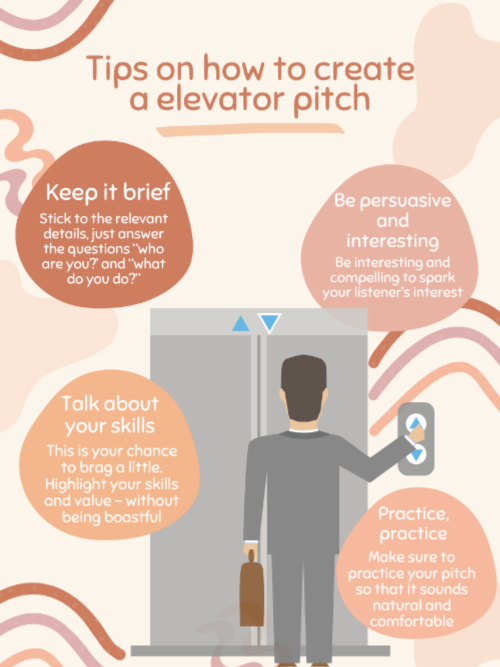Let’s be honest. Networking can be intimidating and most of us would avoid it if we can. Networking for students can feel like there’s a lot of pressure to make a good impression. But it doesn’t have to be that way!
With some good tips and the right mindset, networking can be a great way to connect with industry professionals.
In this how-to article, we’ll walk you through how to prepare yourself for networking in different situations.
Networking Tips for College Students
It doesn’t matter if you’re still in college or are about to graduate, networking is an important skill all college students should learn. Before we get into how to network, it’s important to recognize why it’s important to network.
Why should I network?
We’ve all visited a job search engine and at some point in our lives, we enter a keyword and watch our screen fill as many jobs pop up. Finding a good job on a job search engine can feel like trying to find a needle in a haystack.
This is why networking is important. Instead of searching and sorting through job postings yourself, networking can allow you access to positions that aren’t posted. Did you know that 70-80% of all jobs aren’t publicly advertised? This means even though people can spend up to 80% of their time looking for jobs online, they’re possibly missing out on great opportunities.
Networking Tip #1: Prepare yourself BEFORE you head out
Now, this might seem like a dead giveaway, but preparing beforehand is super important. Before you go to your networking event ask yourself these questions:
- How am I going to answer the question “Tell me about yourself?” or “What do you do for a living?”
Take some time to think about these questions and prepare some answers for yourself. It’s worth slightly memorizing your answer. That way when someone asks you this (and they definitely will) you have something ready to go. There’s nothing worse than fumbling your words and trying to put together an answer quickly. The response to this question is often referred to as an elevator pitch, we’ll go through how to craft a perfect elevator pitch later on.
- What do I want to get out of this networking event? What is my goal?
This is a good one to help you streamline and make a goal. There are many reasons why you would attend a networking event, whether it’s to make connections with industry professionals, to learn something new, to build your referral network, or simply just to be social. Defining why you are going and your goals will help you find out if there is anything else you need to prepare before you go.
Networking Tip #2: Have some conversation starters ready to go
Similar to the first tip, it’s really important to have things already in your head. This includes conversation starters, approaching a group of people (large or small) can be menacing. But with the right approach, you can join in easily.
If approaching a cluster of people is a little too much for you, look for someone else who is also flying solo and approach them instead.
Some good conversation starters can include:
- Industry news or trends: Look these up beforehand, these can be great ways to get other people’s thoughts and opinions.
- The classic: “What do you do for work?”
- The ice-breaker: “What brought you to this event?”
- Opinion-based: “What do you think of the event so far?”
The first interaction you have at a networking event can help you meet more people or get more comfortable with approaching people.
Networking Tip #3: Hit up your Career Counselling or Service Department

Finding the right networking events can be a little tricky, especially if you haven’t done this before. One of the best resources you can use is the career counsellors or service department at your school. These advisors can help you find networking opportunities and events, and give you tips to help build and maintain your network.
Your career counsellors here at ABM College are here to help you in any way they can. Whether you need help preparing for your interview or want to polish your resume until it shines, they’re here to help. Our counsellors are always available for any current student, recent grad, or alumni.
Networking Tip #4: Get Social with it

Networking is a social art, so it’s a good idea to make sure your social media is up to date. One social networking site you need to be on is LinkedIn. LinkedIn is the world’s largest professional network site, with over 20 million users alone here in Canada!
It’s worth putting in some time and effort to have your LinkedIn profile up to date. This means making sure that any outdated information is removed or updated (that one time you volunteered at a charity event in 2006 can be removed),
Some points to make sure are filled out include:
- Add a photo of yourself (Bonus points if you can get professional headshots done!)
- Highlight your skills
- Write summaries of your previous work experience
- Make sure you add your education (even if you haven’t graduated yet still add it)
- Add any certificates or licenses you have
- Add some flair to things like volunteer experience, publications, honors or awards, languages, and any professional organizations you apart of
- Contact information
It’s a good idea to keep your LinkedIn and other forms of social media current and professional. Especially since 70% of potential employers check and look at their candidates’ social media, and to add onto that point 7% of employers plan on adding this to their screening process.
Networking Tip #5: Keep your eye out for networking events online AND in person
Now it’s time to go to the events, online or in person. Check event sites like Eventbrite or Meetup for networking events in your city. You can also do a google search for the industry you’re interested in. For example, if you are interested in graphic design and you live in Calgary, search for “graphic design networking events Calgary”. You’ll be amazed at how many networking events are hosted weekly.
You can join a variety of events, no matter if they are in person or online, think about joining events like:
- Webinars
- Chat groups
- Conferences
- Speed networking events
- Virtual networking events
- Workshops
- Industry Seminars
- Trade Shows
- Career Fairs
If you’re having trouble finding a networking event, head back over to your career counsellors, they’ll be able to help you get on the path to networking.
Networking Tip #6: Join clubs, associations, or take some classes
We know what you might be thinking “why would I take classes when I’m already in college?”. Let us explain, by joining things like clubs, associations, or classes you can build your skills while also being in the same room as like-minded people.
Networking is all about expanding who you are around, a good network is a diverse one. So look for clubs while you’re in college, join professional associations, and keep your eye out for skill-building classes.
Network Tip #7: Take notes and follow up
We get it, networking is sounding more and more like work at this point, and it’s true. Networking takes time, effort, and work. While you’re at your network event, after you have a good conversation with someone, ask for their contact information (this can be something like a business card or a LinkedIn request) and then make some notes on the conversation you just had.
It doesn’t have to be something super detailed, just a few sentences about who the person is and what you talked about. This way, when you go to follow you’ll have all the information you need in your hands. Following up is the best way to make a lasting impression with your new connection.
But how to follow up with a network connection? Follow the tips below:
- Send a personalized message through email or LinkedIn.
This shows that you’re interested in keeping in touch, make sure to send these out 24 hours after meeting someone.
- Invite them to meet for coffee or lunch
This will help you connect further with them. Making good connections is about putting effort into creating and maintaining them. After this step, it’s all about just staying in touch via email or message.
How to make an elevator pitch
An elevator pitch is a quick summary of who you are, your background, experience, and purpose. The reason it’s called an elevator pitch is because it should be short enough to present in a brief elevator ride.
The point of elevator pitches is to share information about you with those who don’t know you. When done right, this little speech can help you introduce yourself to network connections in an interesting way.
What to say in your elevator pitch
Keep it brief
Try to aim to keep your elevator pitch to around 30-60 seconds. You don’t need to detail every work experience you had since you were 16. Just stick to the relevant details, just answer the questions “who are you?’ and “what do you do?”
Be persuasive and interesting
Even though you have a limited amount of time, your elevator pitch should be interesting and compelling to spark your listener’s interest.
Touch on your skills
Try to add things that highlight your assets that can add value in different situations. This is one of the only opportunities to brag a little bit – but don’t go overboard and sound arrogant or boastful.
Practice, practice, practice
This is one of the most important things, the best way to feel comfortable with your elevator pitch. Practice your pitch until the speed and pitch feel natural and comfortable. It shouldn’t sound robotic or over-rehearsed.

Elevator pitch examples for college students
Draw some inspiration from the following examples below. Make sure your speech is tailored to highlight your skills, experiences, and background.
- I am currently studying for my legal assistant diploma at ABM College. I did my practicum at Johnson & Sons law firm, and have taken an interest in family law. I’m about to graduate in a few months so I’m hoping to meet and connect with others in the same industry.
- My name is Emily, I’ve been interested in programming since I was back in junior high. My computer teacher once showed us how to write a basic algorithm and I was sold on programming from there. I started studying Network administration at ABM College. I wanted to come to this event because I enjoy hearing like-minded people talk about topics I’m interested in too. What was your favourite part so far?
- Hi, my name is Stephan, I’m currently studying to be a graphic designer at ABM College. I make graphics and illustrations on the side as well for small businesses and companies. My passion is coming up with new creative ways to express a message and then creating illustrations that people can share on social media.
About The Author

Private Career College
ABM College is a leader in career-focused education, committed to empowering students with industry-relevant skills. With expert instructors and practical training, ABM College delivers high-quality programs in health, business, technology, and more, ensuring graduates are prepared to meet workforce demands. Known for its supportive learning environment and a focus on real-world application, ABM College is a trusted educational partner helping students achieve professional success across Canada.
